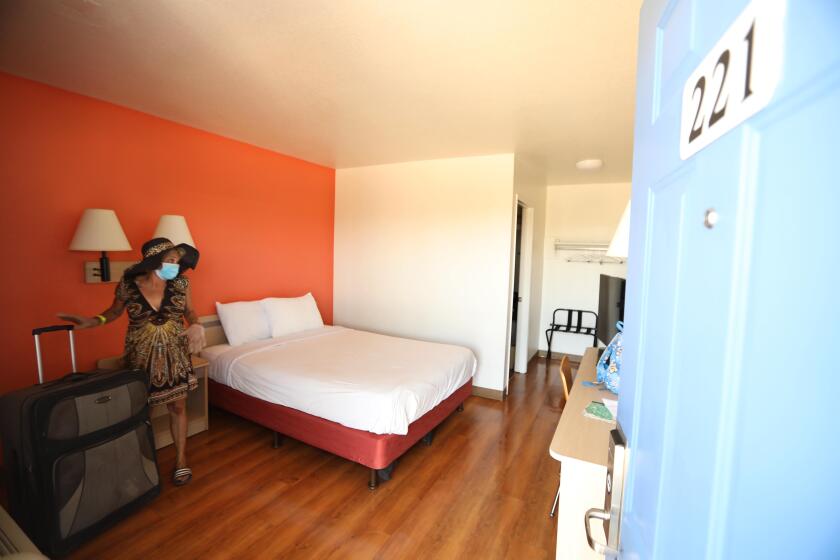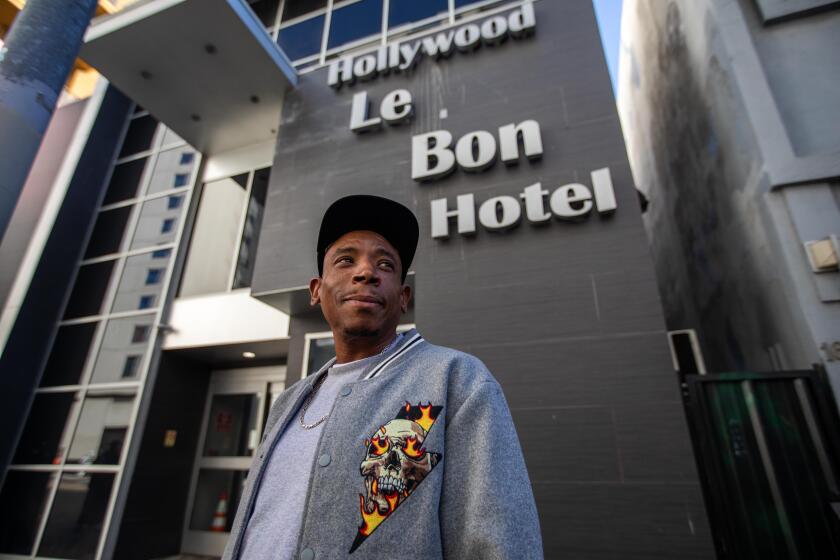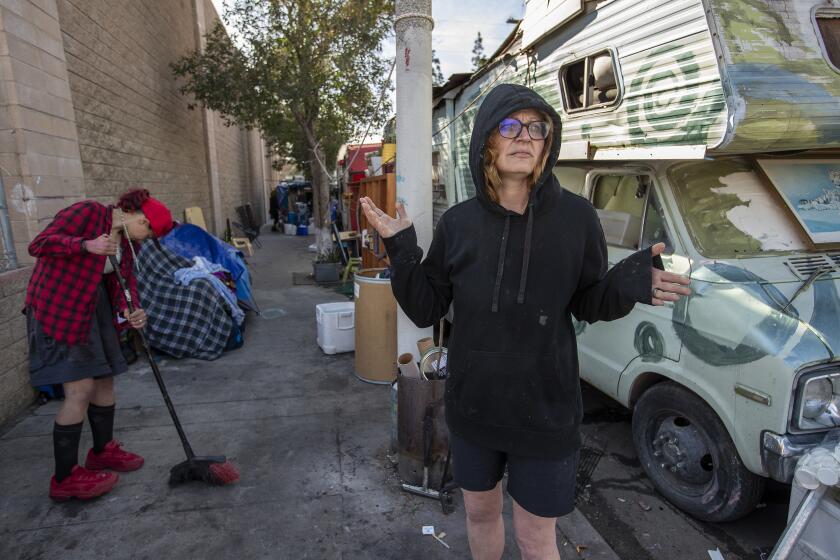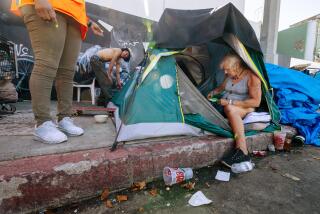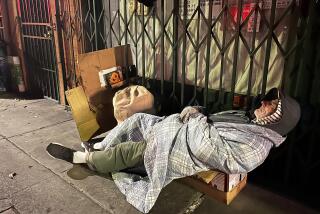Federal judge seeks audit of L.A. homelessness programs
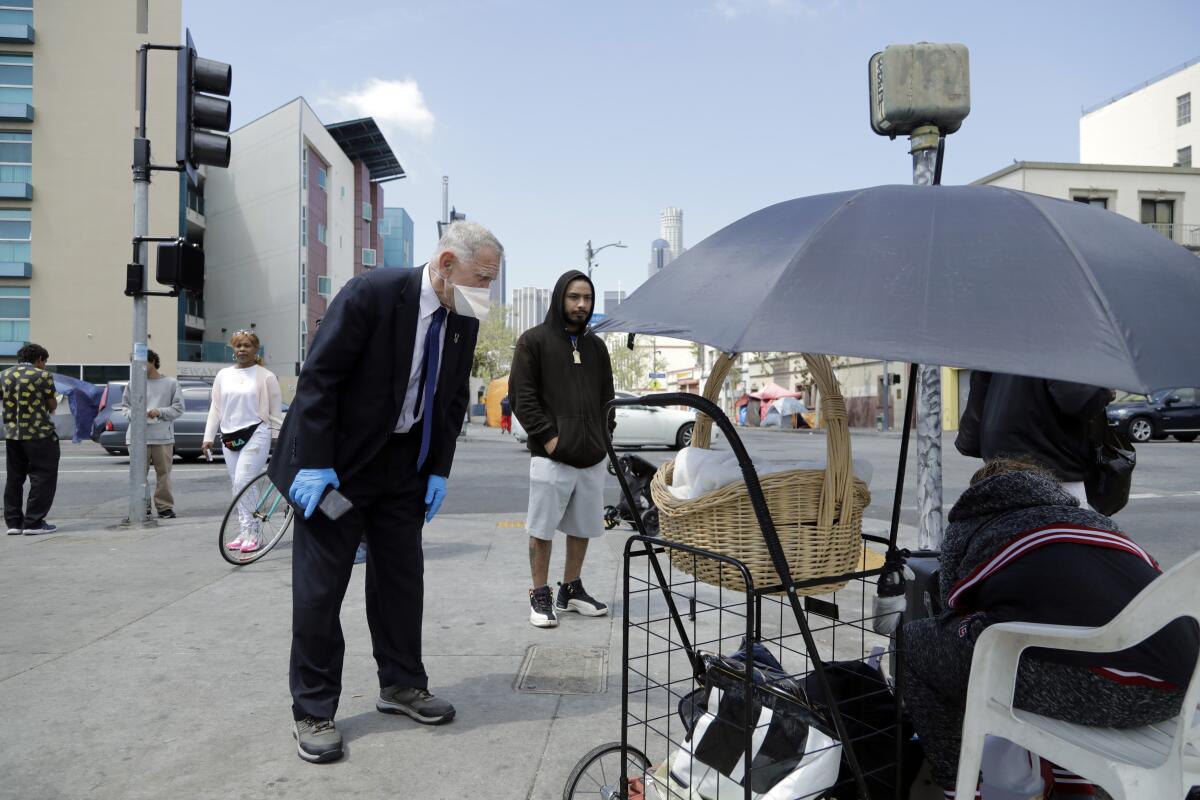
A federal judge wants an independent accounting of homelessness programs in Los Angeles — including Mayor Karen Bass’ signature Inside Safe initiative.
U.S. District Court Judge David O. Carter made his remarks during oral arguments on a motion filed by lawyers for the L.A. Alliance for Human Rights, which has accused the city of failing to live up to the terms of a nearly 2-year-old settlement agreement to build shelter beds and clear homeless encampments. The settlement was reached eight months before Bass was sworn into office.
The alliance said it wants the city to pay it $6.4 million in monetary sanctions.
Carter, who has not yet issued a ruling or spelled out the parameters of such an audit, raised concerns about how public money to fight homelessness is being spent. He requested a more detailed accounting of the work performed by nonprofit homeless service providers — including those participating in Inside Safe, which has been moving unhoused Angelenos into hotels, motels and other facilities.
“Which provider is producing results out there?” he asked. “We have no benchmark, and we have no accountability at this point. It’s just as simple as that.”
Carter also asked whether City Controller Kenneth Mejia has the authority to audit homeless programs run by the mayor’s office. City Administrative Officer Matt Szabo, who advises the mayor and council, testified that the controller could not but said there are other ways the city can conduct audits.
Feds won’t reimburse California $300 million for homeless housing amid COVID. Congress wants answers
A letter by Rep. Robert Garcia (D-Long Beach) asks FEMA to reconsider and pay out the funding to cities that are already strapped for cash.
Mejia disputed that notion Friday, telling the judge on the second day of the hearing that his office can audit mayoral programs.
“When it comes to a city program, especially those housed under elected officials, we have disagreements with the mayor and the city attorney’s office, but we believe there’s nothing in the charter that prohibits the mayor or the City Council from voluntarily submitting themselves to an audit, so we disagree.”
Hours later, Mejia announced on X that he is launching a “focused audit” on Inside Safe, which received $250 million in this year’s city budget.
Bass, who is in France with a delegation of city officials examining preparations for the Olympics, could not immediately respond to a request for comment.
Michele Martinez, special master for Carter, said Bass and City Council President Paul Krekorian had spoken to the judge and offered an independent auditor chosen by the court and paid for by the city.
Mejia said he intends to follow through with his audit.
“Our office welcomes an external, independent auditor to aid in that ongoing litigation,” he said in a statement to The Times. “However, the issues at play in the federal litigation are specific and unique to that case. As the City’s Chief Auditor, it is my responsibility to bring transparency and accountability to specific components of Inside Safe.”
As her Inside Safe program enters its second year, Bass said she is determined to clear the bottleneck keeping homeless residents from getting into permanent homes.
The L.A. Alliance, a group of businesses and residents, alleges that the city repeatedly missed deadlines and negotiated in bad faith over terms of a settlement agreement to shelter at least 60% of people living on the streets in each council district.
Elizabeth Mitchell, the group’s attorney, said the city promised last March that it would come into compliance and provide the alliance with plans to build beds and address homeless encampments in each district.
“We were promised ... that if we held off bringing this to the court for just six months, that they would have a full evaluation of each district. That, to my knowledge, has never been done,” Mitchell said. “Even the numbers that were finally agreed upon by the council members were not fully vetted.”
Scott Marcus, chief assistant city attorney, said the city did not breach the agreement when it comes to bed creation but that it did fail to communicate with the alliance when it sought a citywide program to clean up encampments, as opposed to doing so district by district.
“We could have done a better job keeping the alliance in the loop and communicating with them when our circumstances changed,” Marcus said.
Carter said he would delay a ruling while city officials and lawyers for L.A. Alliance discuss details of the audit and Bass is abroad.
Serena Oberstein, a Northridge resident and nonprofit leader, is challenging incumbent John Lee in a campaign that promises a new approach to homelessness in District 12.
However, the judge said he plans to rule that the city acted in bad faith.
The demands for increased oversight of homeless services are not limited to Mejia and the judge. On Friday, the council voted to seek a separate performance evaluation of services being provided to the city by the Los Angeles Homeless Services Authority.
Councilmember Bob Blumenfield, who drafted the proposal and sits on the homelessness committee, said the city provides tens of millions of dollars each year to that city-county agency.
“We have all known that LAHSA can be opaque at times and, frankly, downright deceptive in terms of how they secure funding from this city,” he said.
Va Lecia Adams Kellum, LAHSA’s chief executive officer, said she looks forward to the assessment.
“I welcome the passage of the motion from Councilmembers Blumenfield and [Monica] Rodriguez,” she said, “and look forward to working with the city on developing a framework that provides greater insight into program performance.”
Times staff writer David Zahniser contributed to this report.
More to Read
Sign up for Essential California
The most important California stories and recommendations in your inbox every morning.
You may occasionally receive promotional content from the Los Angeles Times.
